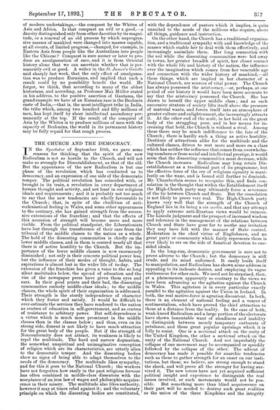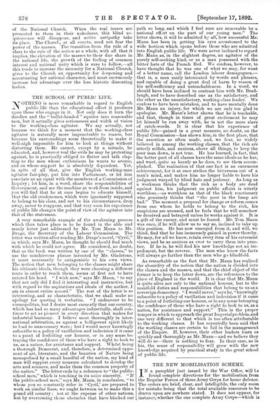THE CHURCH AND THE DEMOCRACY.
TN the Spectator of September 10th, we gave some reasons for thinking that the spirit of the new Radicalism is not so hostile to the Church, and will not make so strongly for Disestablishment, as that of the old. But the appearance of the new Radicalism is but one phase of the revolution which has conducted us to democracy, and an expression of one side of the democratic temper. The political revolution has coincided with, or brought in its train, a revolution in every department of human thought and activity, and not least in our religious ideals and requirements ; and it is probably not too much to say that the new tendencies are wholly favourable to the Church ; that, in spite of the ebullition of anti- ecclesiastical feeling in Wales, and some other appearances to the contrary, she has gained strength from the succes- sive extensions of the franchise ; and that the effects of this accession of strength will become more and more visible. From the political standpoint, the Liberationists have lost through the transference of their case from the tribunal of the middle classes to the nation as a whole. The hold of the dissenting communities is chiefly on the lower middle classes, and in them is centred nearly all that there is of active hostility to the Church. But the im- portance of the lower middle classes is now enormously diminished ; not only is their concrete political power less, but the influence of their modes of thought, habits, and aspirations is almost lost in the wider life of to-day. The extension of the franchise has given a voice to the so long silent multitudes below, the spread of education and the rise of the newspaper press have given them eyes and ears. In their good points and their bad, the dissenting communities embody middle-class ideals ; to the middle classes, the whole spirit of their organisation is addressed. Their strength is the sturdy independence of character which they foster and satisfy. It would be difficult to over-estimate the services they have rendered to the nation as centres of education in self-government, and as centres of resistance to arbitrary power. But self-dependence is a virtue which is much more prominent in the middle classes than in the classes below ; and thus, even on its strong side, dissent is not likely to have much attraction for the great body of the people. But if the strength of Nonconformity does not attract, its weakness is likely to repel the multitude. The hard and narrow dogmatism, the somewhat unspiritual and unimaginative conception of religion which are its characteristics, are utterly alien to the democratic temper. And the dissenting bodies show no signs of being able to adapt themselves to the needs of the democracy. The multitude likes sympathy, and for this it goes to the National Church ; the workers have not forgotten how easily in the past religious fervour has often combined in middle-class dissenters with the acceptance of an iron law of wages and philosophic acquies- cence in their misery. The multitude also likes authority, however it may at times rebel against it ; and the voluntary principle on which the dissenting bodies are constituted, with the dependence of pastors which it implies, is quite unsuited to the needs of the millions who require, above all things, guidance and instruction.
On the other hand, the Church has a traditional organisa- tion, and a traditional sympathy with and knowledge of the masses which enable her to deal with thsm effectively, and increasingly assimilate them. Her long connection with the soil while the dissenting communities were hid away in towns, her greater breadth of spirit, her closer contact with the whole life and history of the nation, the influence over the imagination which comes from her venerable age and connection with the wider history of mankind,—all these things, which are implied in her character of a National Church, are sources of vital power. The Church has always possessed the aristocracy,—or, perhaps, at one period of our history it would have been more accurate to say that the aristocracy possessed the Church. She has drawn to herself the upper middle class ; and as each successive stratum of society lifts itself above the pressure of material wants, and forces itself into an atmosphere of greater culture and enlightenment, she increasingly attracts it. At the other end of the scale, in her hold on the great body of the struggling poor, and in her means for in- creasing that hold, the Church is without a rival. Among these there may be much indifference to the fate of the Church ; there is hardly such a thing as active hostility. Destitute of attractions alike for the multitude and the cultured classes, driven to rest more and more on a class which has neither the influence that comes from overwhelm- ing numbers or from social and intellectual prestige, it would seem that the dissenting communities must decrease, while the Church increases. Radicalism may long retain Dis- establishment as a traditional part of its programme, but the effective force of the cry of religious equality is mani- festly on the wane, and is bound still further to diminish. Mr. Chamberlain seems to recognise this, and finds con- solation in the thought that within the Establishment itself the High-Church party may ultimately force a severance of the tie between Church and State. But the consolation is not likely to prove very real. The High-Church party knows very well that the strength of the Church of England lies in its being a via media, and that any attempt to apply extreme anti-Erastian views would be ruinous. The Lincoln judgment and the prospect of increased wisdom and tolerance in the management of the relations between Church and State have gone far to soothe any irritation they may have felt with the manner of State control. Moderation is the chief virtue of Englishmen, and no great party or community which fairly represents them is ever likely to err on the side of fanatical devotion to one- sided ideals.
In the long-run, democratic government is sure not to prove adverse to the Church ; but the democracy is still crude, and its mind unformed. It easily lends itself to manipulation, and Radicalism has shown some address in appealing to its inchoate desires, and employing its vague restlessness for other ends. We need not be surprised, then, at a phenomenon apparently so contrary to the views we have been advancing as the agitation against the Church in Wales. This agitation is in every particular exactly parallel to the agitation against the Union in Ireland. In both, the real motive-force is agrarian discontent. In both, there is an element of national feeling and a veneer of sentimentalism, which have proved the chief attraction to those at a distance from the reality. In the case of both, weak-kneed Radicalism and a large portion of the electorate have shown lamentable want of steadiness and inability to distinguish between merely temporary outbursts of petulance, and those great popular uprisings which it is folly to resist. One is a sectional attack on the unity of the United Kingdom, the other a sectional attack on the unity of the National Church. And not improbably the collapse of one movement may be accompanied or speedily followed by the collapse of the other. The advent of democracy has made it possible for anarchic tendencies such as these to gather strength for an onset on our insti- tutions, but these, we believe, are strong enough to stand the shock, and will prove all the stronger for having sur- vived it. The new voters have not yet acquired sufficient political insight and experience to distinguish the real issues involved, or such movements would not be pos- sible. But something more than blind acquiescence on their part will be needed to destroy such great realities as the union of the three Kingdoms and the integrity of the National Church. When the real issues are presented to them in their nakedness, this blind ac- quiescence will disappear, and active antipathy take its place. The Church, at all events, need not fear the power of the masses. The transition from the rule of a class to the rule of the nation as a whole, with all that it implies, the elevation of the masses to their due share in the national life, the growth of the feeling of common interest and national unity which is sure to follow,—all this tends to increase the necessity for a National Church, gives to the Church an opportunity for deepening and accentuating her national character, and must enormously increase her advantage over the less historic dissenting bodies.



































 Previous page
Previous page